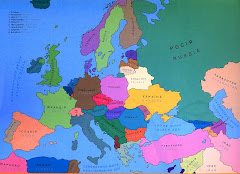 Collage: Upper left, from a Leon Savich book of poems; his grandson Dmitriy, in Ukrainian shirt; Savich friend Vera and others reading and remembering; lower left, the poster of Cossack Savich on horse of freedom; lower right, historian Mikhail, poet Anton, library director Iryna Andreenova.
Collage: Upper left, from a Leon Savich book of poems; his grandson Dmitriy, in Ukrainian shirt; Savich friend Vera and others reading and remembering; lower left, the poster of Cossack Savich on horse of freedom; lower right, historian Mikhail, poet Anton, library director Iryna Andreenova.
The Library sponsored an interesting forum last week commemorating the 10th anniversary of the death of Starobelsk poet Ivan Savich. I had never heard of Savich, but by the end of the day I had a pretty good understanding of his life and works and his contributions to the cultural life of Starobelsk and eastern Lugansk. Savich wrote in Ukrainian, and explored Ukrainian themes in his poetry, which got him in trouble with Soviet authorities, who had him jailed and sent off to the Gulag in Siberia for 8 years.
The Library has all 30 of his books, and they were proudly on display around the reading room, along with a nice exhibit and a great poster of one of Savich’s birthday celebrations (Savich as a Cossack riding a horse to freedom, holding a Ukrainian flag). Best of all, Starobelsk poets, writers, an historian, and literary people came with their own books and memories to talk about Savich and to read his poetry. I didn’t get it all (зто нормолно), but what I got was moving. This was a strong Ukrainian nationalist in the tradition of Taras Shevchenko, Ivan Franko, Leslie Ukrainka, and the more modern Lina Kostenko of Kiev, right here in eastern Ukraine.
According to his grandson, Dmitriy, who was present at the forum, he was a wonderful man, creative and funny, a determined man, tolerant and social, who knew other famous poets like Volodymyr Sosvura and Mikhail Rylskiy. Dmitriy, wearing a traditional embroidered Ukrainian shirt under his jacket, reminded me of many people I had met in western Ukraine who were strong patriots, proud of their Ukrainian heritage. I leaned over and asked Anton: "Is Dmitriy from Starobelsk?" "Sure," he answered, "he takes after his grandfather."
When I got home I googled Ivan Savich but couldn't find the Starobelsk poet who had died in 2000. That was disappointing, indicating that he is not widely known. I did, however, find Sosvura (1898-1965) and Rylskiy (1895-1964) and they present an interesting contrast.
Sosvura, like Savich, wrote in Ukrainian and eventually sought to promote Ukrainian traditions torn asunder under Soviet rule. He too was jailed, for what was called at the time "nationalistic undertones," meaning a reverence for things Ukrainian, rather than total commitment to the Soviet regime.
The following Sosvura poem demonstrates this, in feeling and language. Actually, its message goes beyond "undertones" to outright Ukrainian patriotism!
The following Sosvura poem demonstrates this, in feeling and language. Actually, its message goes beyond "undertones" to outright Ukrainian patriotism!
"Love Ukraine
sleeping and waking
Cherish Ukraine, its beauty
forever, living
And a new language, and its nightingale.''
Rylskiy, on the other hand, was faithful to the Soviet regime, wrote in Russian, and praised the communist revolution. He was a member of the Communitst Party and won the Lenin Prize for poetry in 1960. These three poets must have had some interesting conversations, Savich the youngest, and perhaps the wisest.
sleeping and waking
Cherish Ukraine, its beauty
forever, living
And a new language, and its nightingale.''
Rylskiy, on the other hand, was faithful to the Soviet regime, wrote in Russian, and praised the communist revolution. He was a member of the Communitst Party and won the Lenin Prize for poetry in 1960. These three poets must have had some interesting conversations, Savich the youngest, and perhaps the wisest.
Unfortunately, I cannot read the poems in Russian or Ukrainian, so I am looking for English translations. I am sure a lot is lost in translation, but sometimes you can get the essence of the words. I wish someone would take this on as a scholarly project, beginning with the poems of Savich, a prolific writer who is largely unknown. Nothing gets you into the heart of the matter, in this case into the essence of what is Ukrainian, faster than a poem. Translating poets who wrote in Ukrainian would be a great contribution to our understanding of this great country now struggling to coaloesce its own national identity.
Of one thing I am certain. Savich knew Taras Shevchenko’s poems like his own. Shevchenko was revered then, and still is; he is considered the father of Ukrainian literature, and he had a tremendous influence among generations of poets, writers and artists after him. Among Savich's favorites must have been “Testament,” because Shevchenko's love of Ukraine shines through.
“When I am dead bury me
In my beloved Ukraine,
My tomb upon a grave mound high
Amid the spreading plain
So that the fields, the boundless steppes,
The Dnieper’s plunging shore
My eyes could see, my ears could hear
The mighty river roar.…
Oh bury me, then rise ye up
And break your heavy chains.
And water with the tyrants’ blood
The freedom you have gained.
And in the great new family,
The family of the free,
With softly spoken, kindly word
Remember also me.”
My tomb upon a grave mound high
Amid the spreading plain
So that the fields, the boundless steppes,
The Dnieper’s plunging shore
My eyes could see, my ears could hear
The mighty river roar.…
Oh bury me, then rise ye up
And break your heavy chains.
And water with the tyrants’ blood
The freedom you have gained.
And in the great new family,
The family of the free,
With softly spoken, kindly word
Remember also me.”




























No comments:
Post a Comment